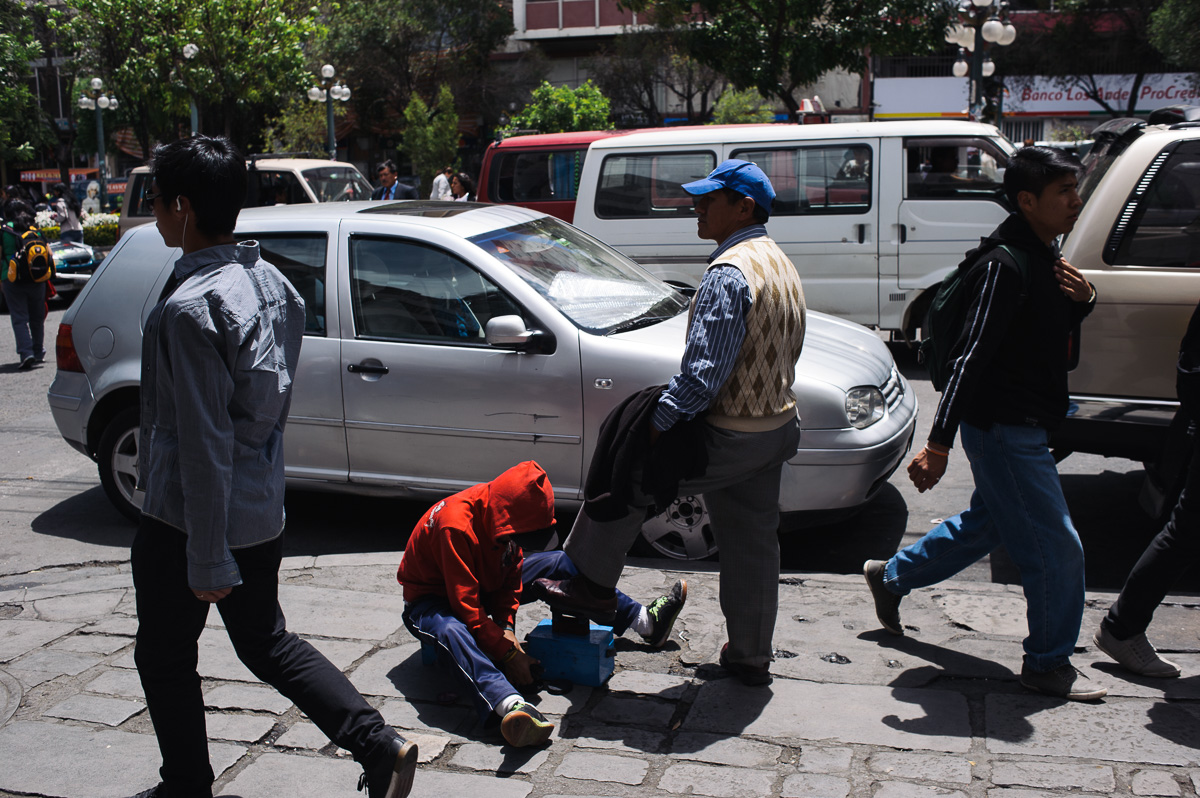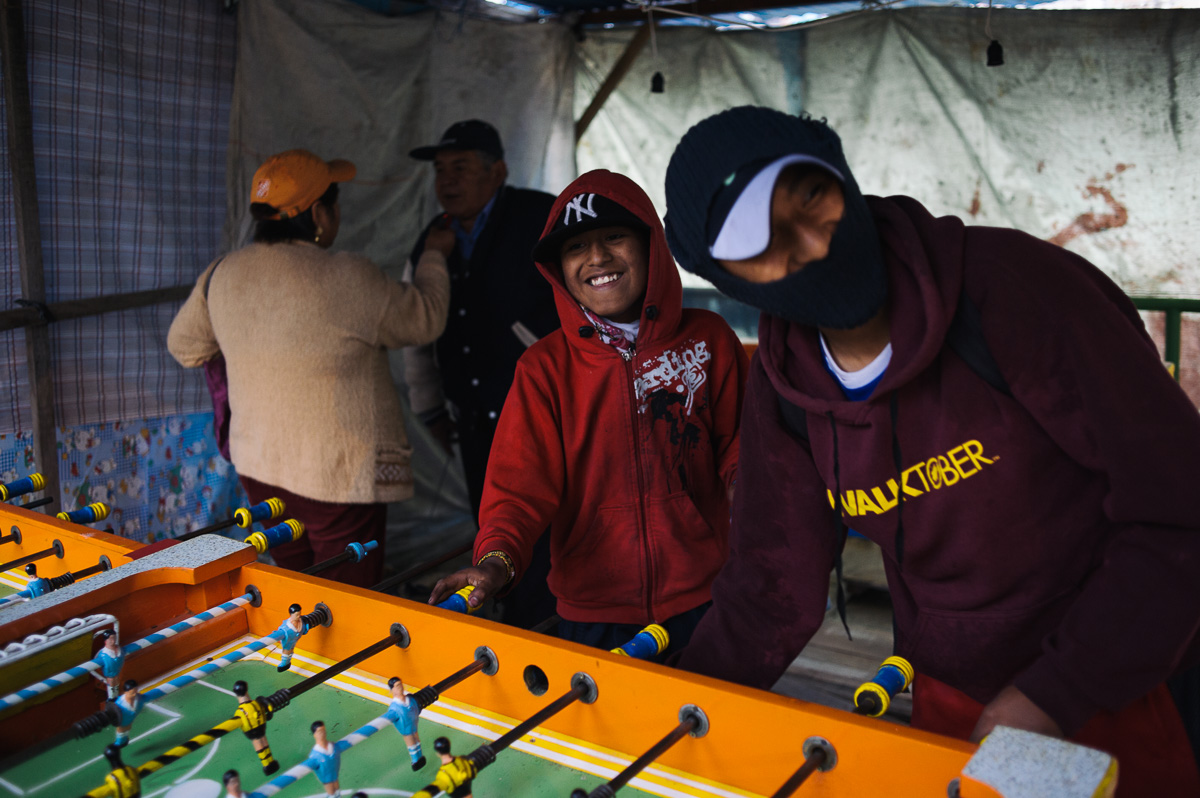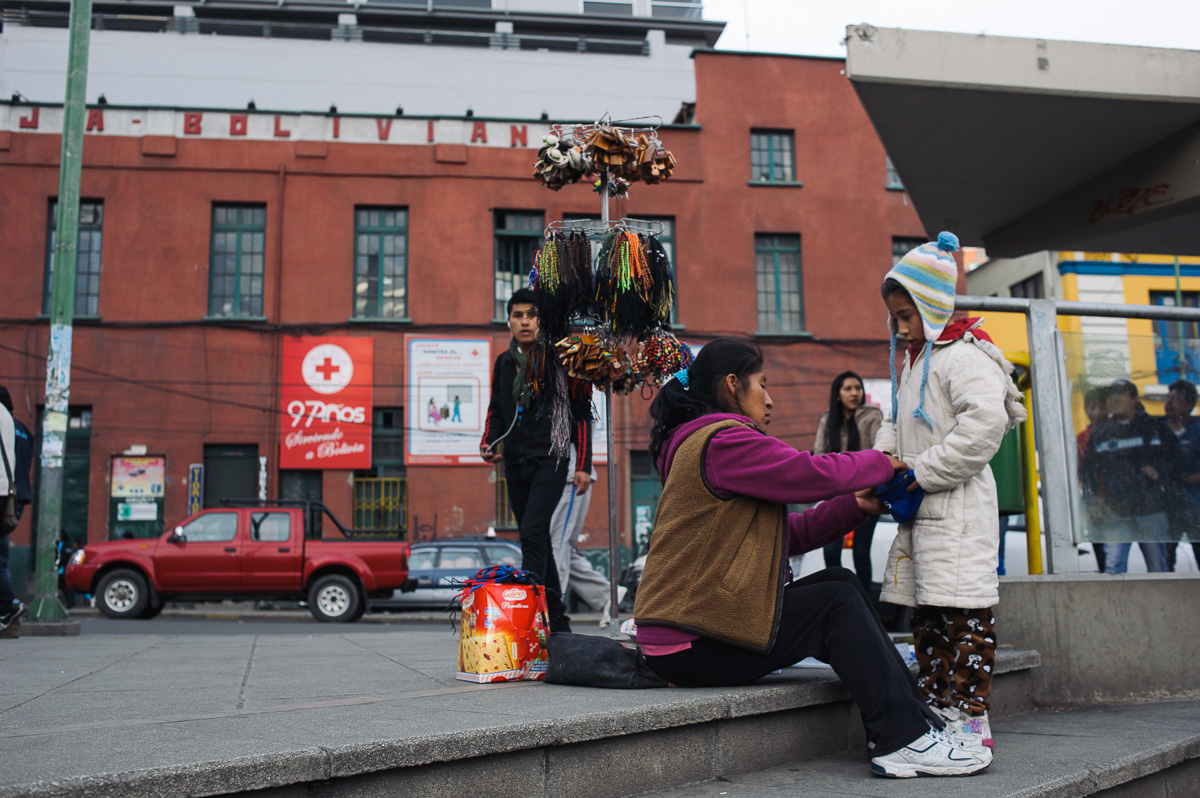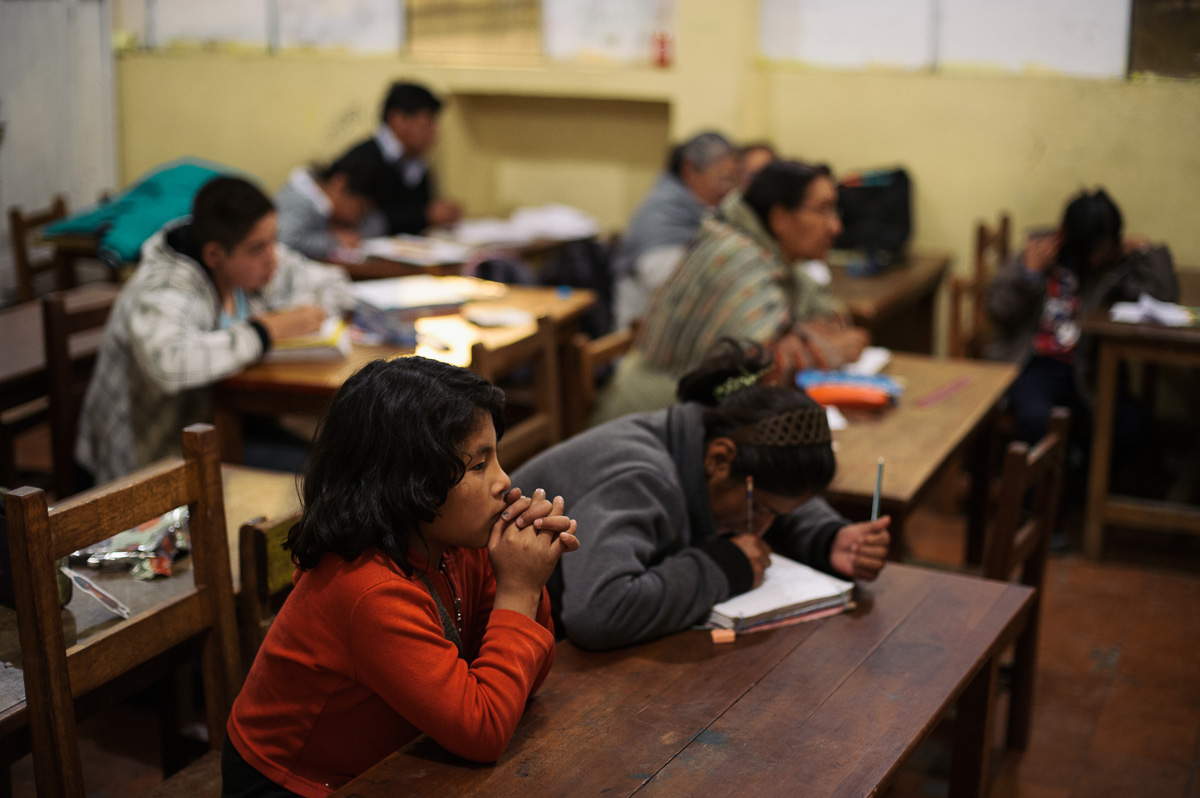
The sun sets over the city of La Paz, sitting in the heart of the Andes mountain range in Bolivia.

Young girls walk through a poor neighbourhood in the city of El Alto, overlooking the Bolivian capital of La Paz.

Ruben Flores (13) (left) prepares his bag with his friend, Roberto (15) (right), in the locker-room of the "New Day Foundation" association in La Paz, Bolivia. Ruben is a shoe-shiner and helps support his family through the wages he earns.

Ruben Flores (13) steps out of the small room his family inhabits in the "New Day Foundation" association in La Paz, Bolivia. Ruben is a shoe-shiner and helps support his family through the wages he earns.

Ruben Flores (13) walks the streets of La Paz, Bolivia, with his shoe-shining box and stool, in search of clients.

Ruben Flores (13) shines the shoe of a man in the street of central La Paz, Bolivia, as pedestrians walk past.

Ruben Flores (13) shines the shoe of a man in the street of central La Paz, Bolivia.

Ruben Flores (13) drinks a cup of tea given to him by a women's organisation, whilst he works as a shoe shiner on the streets of La Paz, Bolivia.

The shoe-shining kit of a "lustradore" sits in the San Francisco plaza in La Paz, Bolivia. All of the shoe polish and brushes fit into the box, which is topped by the small stool the lustradores sit on whilst working.

Ruben Flores (13) (right) and his friend, Roberto (15) (left), sit in a passageway covered with graffiti of shoe-shiners in La Paz, Bolivia. "Lustradores" (shoe-shiners) are stigmatised in the city, forcing the vast majority to wear balaclavas covering their faces.

Ruben Flores (13) holds the money he earned from a day's shoe-shining, 26 Bolivianos, just under $4 (USD), pictured at his home in La Paz, Bolivia.

Ruben Flores (13, centre) and his friend, Roberto (15, right), play table-football in an outdoor "fair" in La Paz, Bolivia. The boys took the afternoon off from working as shoe-shiners, and spent some of their earnings on recreation.

Jonny, Ruben's five year old brother, stands in a window of the "New Day Foundation" as his brother plays football in the street in La Paz, Bolivia.

Edith (10) tells off her brother, Ruben (13), at their home at a centre for shoe-shiners in La Paz, Bolivia, on November 29, 2014. Ruben is the only one of his four siblings who works, and helps to support the family.

Ruben Flores (13) sits with his younger siblings as they watch television in the "New Day Foundation" centre where the family lives in La Paz, Bolivia. Ruben works as a shoe-shiner, and his income helps to provide for the family when times are tough.

Edith Flores (10, centre) helps her sister, Rayna (7) with homework as Ruben watches in the "New Day Foundation", a centre for shoe-shiners where the family lives, in La Paz, Bolivia.

Ruben Flores (13), a shoe-shiner in La Paz, sits in the bed he shares with his four siblings and parents at the "New Day Foundation" association in La Paz, Bolivia, on December 5, 2014. Ruben works as a shoe-shiner in the Bolivian capital, helping to support his family with his earnings.

Edith Flores (10) sweeps the floor of the locker-room in the "New Day Foundation", a centre for shoe-shiners in La Paz, Bolivia. Edith's brother, Ruben (13), and her father, Jonny, both work as shoe-shiners -- a highly stigmatised. Edith does not formally work for pay, but regularly helps her mother clean the centre, where she is care-taker and the family live.

Jonny, Ruben's five year old brother, sits on a staircase in the "New Day Foundation", a centre for shoe-shiners where he lives with his family in La Paz, Bolivia.

William Walas Cruz (28) poses for a picture in the San Francisco plaza in central La Paz, Bolivia. William helps to run the "New Day Foundation", a centre for shoe-shiners in the Bolivian capital. He is also studying business administration at university in La Paz.

A young boy works as a "vocedore", touting for minibus passengers at a bus-stop in the city of El Alto in Bolivia.

A young boy works as a "vocedore", touting for minibus passengers at a bus-stop in La Paz, Bolivia. As well as calling the bus route to passengers and potential clients, the vocedores open and close the minibus door, a job deemed "hard labour" and forbidden for young children.

Albero, 9, cleans a car window in a queue of traffic at a traffic-light on a major road in La Paz, Bolivia. Albero earns 1 boliviano ($0.14 USD) per car window he cleans. Despite working under the legal age, police officers regularly passing him by never pulled him up for working.

Albero, 9, cleans a car window in a queue of traffic at a traffic-light on a major road in La Paz, Bolivia. Albero earns 1 boliviano ($0.14 USD) per car window he cleans. Despite working under the legal age, police officers regularly passing him by never pulled him up for working.

Brandon (13) works on his family's stall in a street market in La Paz, Bolivia. He has been working since he was 7.

A lady helps fasten a money pouch on to a young girl helping her work at a small stall on the roadside in La Paz, Bolivia.

A young girl works on a street-side stall selling mobile-phone accessories in La Paz, Bolivia.

A young boy sells "Santa" hats on a pedestrian bridge at night in La Paz, Bolivia.

A lady walks down a street in a poor area of La Paz, Bolivia.

A lady works at a pop-corn stand as her young child sits on the floor in La Paz, Bolivia. Many parents take their young children with them when they work.

Felix, 17, poses for a picture in Mariscal Sucre, a poor, outlying neighbourhood of El Alto, Bolivia, where he lives and has started a shop. Felix has worked since he was a young boy, and started a small grocery store in his neighbourhood. He is now in his second year of studying Systems Engineering at university in El Alto, whilst still running his shop. [Alternatives available]

A child sleeps as his mother begs on a pedestrian bridge in central La Paz, Bolivia.

Schoolgirls walk to school in the early morning in La Paz, Bolivia. "In Bolivia, there are two societies: those who raise their children to have an education and one day become president; and those who raise their children to work to survive" says Alex Narvaez, who deals with child workers in the city of El Alto.

Children play in the grounds of a school in an outlying, poor neighbourhood of El Alto in Bolivia.

Pupils sit during a night-school class in La Paz, the Bolivian capital. The Bolivian law dictates that child workers must still attend school, and many children in this neighbourhood attend nightschool to allow them to work during the day. The children sit alongside adults who are belatedly getting a primary education.

Pupils leave a night-school class in La Paz, the Bolivian capital. The Bolivian law dictates that child workers must still attend school, and many children in this neighbourhood attend nightschool to allow them to work during the day. The children sit alongside adults who are belatedly getting a primary education.

Betsabel (8) poses for a picture in her classroom after a night-school class with her father in La Paz, the Bolivian capital. Betsabel works for her godparents as domestic help, earning her keep from them, despite being two years too young to legally work under Bolivia's child labour laws.

Betsabel (8) and her father, a taxi-driver, leave a night-school class in the Bolivian capital, La Paz. Betsabel works for her godparents as domestic help, earning her keep from them, despite being two years too young to legally work under Bolivia's child labour laws.

Women dressed in traditional outfits take part in a street-celebration of a saint in a working class neighbourhood of La Paz, Bolivia.

A tunnel leads into the "Los Yungas" region of Bolivia, a major coca-producing area.

Brandon, 9, climbs down a dirt bank on his way to pick coca leaves in a plantation outside of the village of Coripata in the Los Yungas region of Bolivia. Brandon is too young to legally work, but earns 4 bolivianos per pound of coca leaves picked; generally around 32 bolivianos per day ($4.60 USD), which he gives to his mother.

Brandon, 9, picks coca leaves in a plantation outside of the village of Coripata in the Los Yungas region of Bolivia. Brandon is too young to legally work, but earns 4 bolivianos per pound of coca leaves picked; generally around 32 bolivianos per day ($4.60 USD), which he gives to his mother.

Brandon, 9, lays out coca leaves to dry in a plantation in the village of Coripata in the Los Yungas region of Bolivia. Brandon is too young to legally work, but earns 4 bolivianos per pound of coca leaves picked; generally around 32 bolivianos per day ($4.60 USD), which he gives to his mother.

Brandon, 9, lays out coca leaves to dry in a plantation in the village of Coripata in the Los Yungas region of Bolivia. Brandon is too young to legally work, but earns 4 bolivianos per pound of coca leaves picked; generally around 32 bolivianos per day ($4.60 USD), which he gives to his mother.

Brandon, 9, plays with a dog at the house of his "godfather", the coca plantation owner for whom he works, in the village of Coripata in the "Los Yungas" region of Bolivia.

Brandon, 9, plays with a toy car at the house of his "godfather", the coca plantation owner for whom he works, in the village of Coripata in the "Los Yungas" region of Bolivia.

Children play in the village of Coripata, a village in the Los Yungas coca-producing region of Bolivia. "Nearly all" of the people living in the village work in coca production, says Angel, a plantation owner in the village. Many of the village's children work exploiting the crop.

An effigy of a thief hangs from a telegraph pole in a poor neighbourhood in the city of El Alto, the twin-city of La Paz, in Bolivia, as a warning to thieves that if they steal from the neighbourhood, then a similar fate will await them.

Girls watch a show put on in La Paz, Bolivia. "In Bolivia, there are two societies: those who raise their children to have an education and one day become president; and those who raise their children to work to survive" says Alex Narvaez, who deals with child workers in the city of El Alto.

A woman carries her young child through an underpass frequented by young shoe-shiners in La Paz, Bolivia.


















































